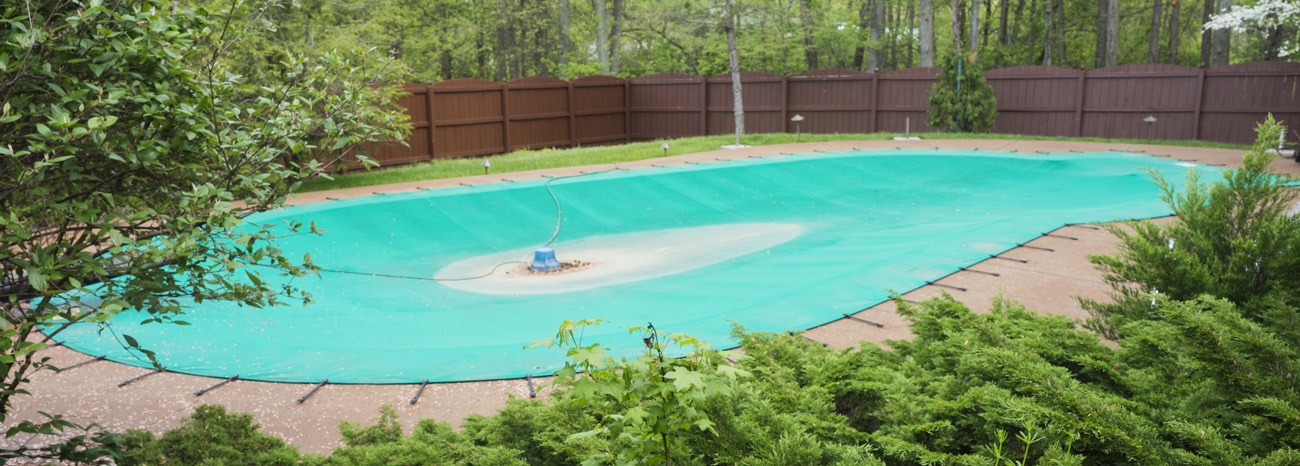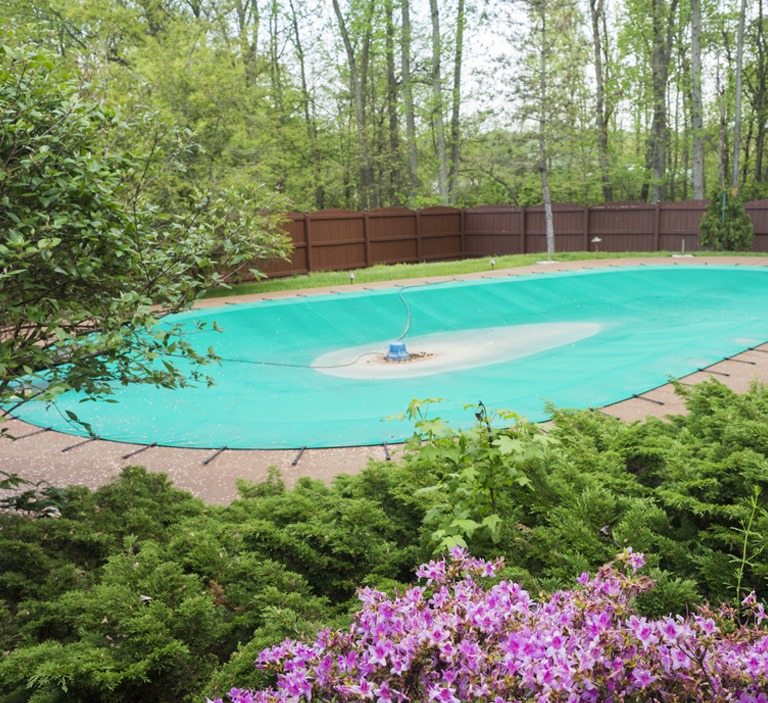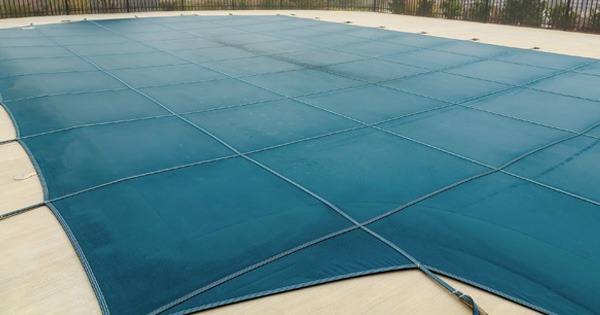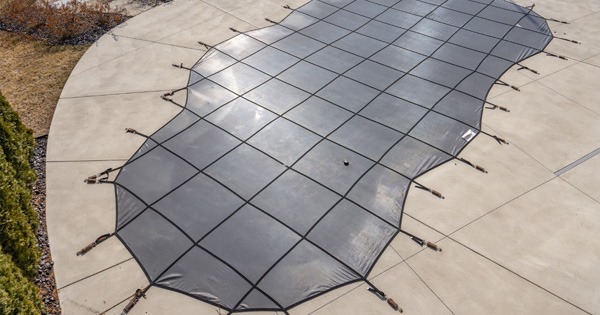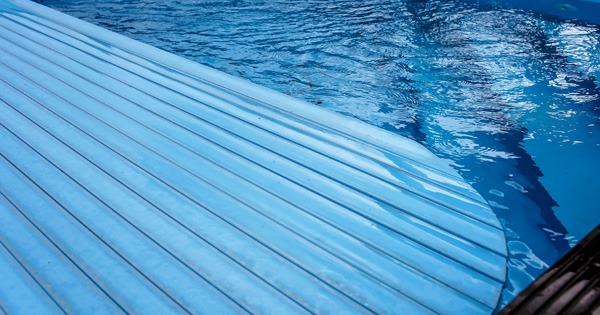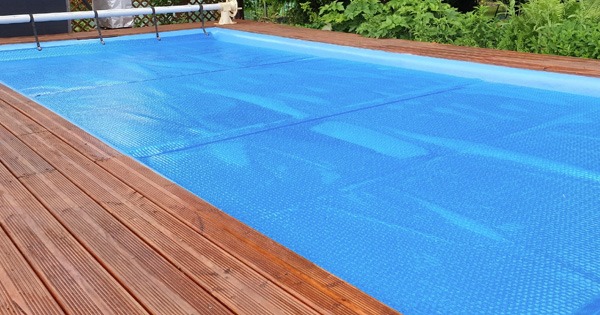As a pool professional, I cannot stress enough the importance of investing in a high-quality pool safety cover. Pool safety covers not only protect your loved ones from potential accidents but also help maintain the cleanliness and integrity of your pool and add to your pool’s energy efficiency.
Pool covers come in a range of sizes and types, including:
- Mesh safety covers
- Solid safety covers
- Automatic safety covers
- Hybrid safety covers.
In this article, we will discuss the various types of pool safety covers including their features, benefits, and drawbacks. We’ll also touch on things you can consider when choosing the type of pool cover that is the best fit for how you use your pool.
Mesh safety covers
Mesh pool covers are lightweight, easy to use and typically last longer than solid pool covers. Since the water is able to pass through the mesh, using this kind of cover means you won’t need a pool cover pump.
Features:
- Made from a tightly woven fabric that allows water to pass through
- UV protection blocks sunlight, preventing algae growth
- Lightweight and easy to handle
- Requires minimal storage space
Benefits:
- Simple installation and removal process
- Reduces the need for regular pool cleaning, as debris is kept out
- Generally more affordable than other types of covers
- Provides a level of safety by preventing accidental access to the pool
Drawbacks and limitations:
- Does not provide complete insulation, which can lead to increased energy costs for heating the pool
- Can allow some fine particles and contaminants to pass through, which may affect water quality
Solid safety covers
Solid pool covers offer extensive protection and safety. Because they form an impenetrable barrier to your pool water, you will require a pool cover pump to remove excess water accumulation over the off-season.
Features:
- Made from a solid, non-permeable material that provides a complete barrier
- Prevents water, debris, and sunlight from entering the pool
- Usually comes with a built-in water pump or drain panel for excess water removal
Benefits:
- Offers better insulation and chemical balance maintenance than mesh covers
- Keeps debris, dirt, and contaminants out of the pool, reducing the need for cleaning and maintenance
- Provides enhanced safety by preventing access to the pool
Drawbacks and limitations:
- Heavier and more challenging to install and remove compared to mesh covers
- Requires a pump or drainage system to remove excess water after heavy rainfall
- Can be more expensive than mesh covers
Automatic safety covers
Automatic pool covers come in mesh or solid fabrics, giving you ease of use and the exact type of cover you want for your pool. Instead of extending or retracting your cover manually, you do it with the push of a button.
Features:
- Motorized system that opens and closes the cover with the push of a button
- Made from a variety of materials, such as vinyl, reinforced PVC, or high-grade polypropylene
- Can be installed on new pools or retrofitted to existing pools
Benefits:
- Ultimate convenience and ease of use
- Provides excellent insulation and debris protection
- Enhances pool safety by preventing unauthorized access
- Can reduce pool heating and chemical costs
Drawbacks and limitations:
- Higher initial installation cost compared to other cover types
- Requires regular maintenance and occasional repairs, which can be costly
- May not be suitable for all pool shapes and sizes
Hybrid safety covers
A hybrid pool cover brings you the best of both worlds, combining the features of solid and mesh safety covers. Depending on how you use your pool throughout the year, this could be an ideal choice.
Features:
- Combines the lightweight convenience of mesh covers with the insulation and debris protection of solid covers
- Made from a combination of mesh and solid materials
- Often features a reinforced center strip for added strength and durability
Benefits:
- Provides excellent debris protection and water filtration
Allows for easier installation and removal than solid covers
Offers better insulation than mesh covers alone, reducing energy costs
Drawbacks and limitations:
- Generally more expensive than mesh or solid covers
- May not provide the same level of insulation as a full solid cover
- Can be heavier than mesh covers, making installation and removal more challenging
Solar Pool Covers
Solar pool covers look like a giant sheet of bubble wrap across the surface of your pool. While they help prevent debris from entering your pool they are not the best choice for safety.
Features:
- Made from a lightweight, bubble-like material that harnesses the sun’s energy
- Transfers solar heat into the pool, raising water temperature
- Often transparent or translucent to allow maximum sunlight penetration
- Can be cut to fit any pool shape or size
Benefits:
- Helps increase pool water temperature using solar energy, reducing heating costs
- Minimizes water evaporation, conserving water and maintaining chemical balance
- Provides a layer of protection against debris and dirt
- Generally more affordable and easier to handle than other types of safety covers
Drawbacks and limitations:
- Not designed to support weight, so it does not provide the same safety features as mesh, solid, or automatic covers
- Durability can be lower than other cover types, requiring more frequent replacements
- Although it provides a barrier against debris, it does not offer the same level of protection as other safety covers
Factors to Consider When Choosing a Pool Cover
Pool Shape and Size
The shape and size of your pool are important factors to consider when determining the type of safety cover you should choose. Most covers are designed for standard rectangular pools, but many manufacturers offer custom-made options for irregularly-shaped or large-sized pools. The size will also impact the cost of the cover, as larger pools require more material.
Local Climate and Weather
You should also take into account your local climate and weather conditions. If you live in an area with harsh winters or heavy snowfall, a solid safety cover might be the best choice since it provides better insulation and prevents snow from entering the pool. On the other hand, a mesh cover might be a better choice for regions with mild winters because they allow rainwater to filter through into the pool.
Frequency of Use
How often you use your pool should also influence your choice of pool cover. If your pool is used infrequently or is closed for the winter, a solid or automatic safety cover might be ideal since they offer the most robust protection and insulation. However, if your pool is used regularly, a mesh or automatic cover could be more convenient due to their ease of use and quick removal process.
Budget Constraints
Of course, your budget will play a role in your decision. Mesh covers are generally more affordable than solid or automatic covers, but they offer less insulation. Solid covers provide better protection and insulation, but they can be more expensive and might require a pump for water removal. Automatic covers offer the best convenience but come with a higher price tag and potential maintenance costs.
Aesthetic Preferences
Last but not least, the appearance of the cover might also be a consideration. Some people prefer the sleek look of automatic covers or the simplicity of mesh covers. Others might prefer the robust appearance of solid covers. Pool covers come in different colors, allowing you to choose one that complements your pool area.
Consider all of these factors, decide what’s best for you and make an informed decision in choosing a pool safety cover that fits your specific needs and circumstances.
Ask a Professional
Consulting a pool and spa professional is essential when making a decision about pool safety covers. Expert advice ensures proper installation and maintenance, which adds to the longevity and effectiveness of your cover.
Our Pool and Spa experts can offer advice based on your specific needs, ensuring that you invest in a cover that works best for you and your pool. Most of all, we can give you peace of mind. Call us at 215.799.2008 or use the form below to contact us.

